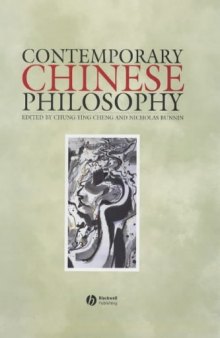دانلود کتاب Contemporary Chinese Philosophy
by Chung-Ying Cheng|
|
عنوان فارسی: فلسفه معاصر چینی |
 دانلود کتاب
دانلود کتاب
 جزییات کتاب
جزییات کتاب
The past quarter century has seen a new trend: in the Anglo-American sphere it is the rise of 'continental philosophy', and more generally 'postcolonialism', and finally 'globalization'. Most obnoxious to me are the combinations of traditional philosophies with postmodernism, e.g. mixing deconstruction or hermeneutics with indigenous philosophies--in the Chinese case, Confucianism or Taoism.
Under the 'modern' or 'postmodern' dispensations, when one views philosophy from a materialist or empiricist standpoint, there is something hopelessly artificial and arbitrary (trading on metaphor, mythology, and even theology) and ultimately sterile and obscurantist about maintaining a metaphysical system in the traditional sense, even one that purports to accommodate modern scientific discoveries. Updating traditional metaphysics is very much like updating and liberalizing religions.
Co-editor Bunnin in his Introduction indicates two categories of philosophers to be excluded: (1) lesser though better-known philosophers, mainly Mao; (2) Chinese philosophers whose work fits entirely into the category of Western philosophy, e.g. philosophy of science (including the dialectics of nature). That's a shame, for it is this second category that most interests me. Already a dubious policy is in place about what is distinctively Chinese. (Marxism is included in this anthology, based on those contributions considered most distinctively Chinese and original.)
In the final chapter, editor Cheng outlines five stages of Chinese philosophy's response to the challenge of the West (logic, science, analysis, identity issues), and sketches current issues (stage five) not treated in the previous chapters. The current issues are: (1) I Ching -- issue of change, (2) the human person, (3) moral metaphysics, (4) nonseparation of method & truth (traditional philosophy was methodologically underdeveloped), (5) science & scientific methodology -- problem for holism, (6) undeveloped political philosophy. Cheng claims traditions work like scientific theories (cf. Quine's holism) in the process of a dialogue of civilizations.
I consider the editor's last word to sum up the bankruptcy of the book's agenda. It's all about the packaging of a tradition, based on dubious metaphysics and premises. It turns out to be an ideological aspect of globalization hype. While one can gain usable information from this anthology, one would be well-advised to turn elsewhere for perspective and synthesis.









 این کتاب رو مطالعه کردید؟ نظر شما چیست؟
این کتاب رو مطالعه کردید؟ نظر شما چیست؟
